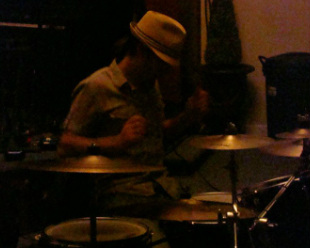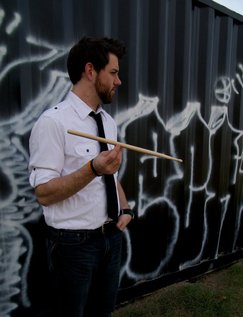
If you want to improve as a musician, you need to listen to good musicians. This is actually one of the easiest things we can do to grow, but it's often overlooked. I play drums so I'm going to talk in terms of drums and drummers, but this principle is true for any musician.
As a drummer, I want to listen to the best drummers I can as much as I can. By listening to top notch drummers, my musical imagination is stretched. Now I can't always play what they play just by listening, but over time I start to think like them. And with practice, eventually things start to show up in my playing that resemble things I've heard and seen them do.
Now, if I only listen to one band, I will eventually sound like the drummer for that band. If I listen to lots of drummers from lots of different bands and different genres, my imagination grows evenly and I become a much more well-rounded drummer that can play lots of different styles. This will make you a better drummer overall and will give you a greater appreciation of all music. Don't be narrow-minded and arrogant about your style of music. No genre is all-encompassing and no style is a complete waste of time. All have unique facets that are beneficial to a drummers well-rounded growth.
You might be wondering how you can listen to great drummers without spending tons of money on expanding your music library? Well, there are lots of ways, but my favorite resource is a website called
Drummerworld. It offers videos and recordings of the worlds top drummers as well as transcriptions, forums, and many other resources and is completely free.
So be diligent and consistent in your practice, but make sure to also listen to great musicians. You'll grow faster and be a better musician for it.
-Jonathan

NOTE FROM SHANE...
Jonathan and I met in college and have been friends for almost 10 years. We played together in a college ensemble before I joined him in the rock megagroup Hope's Fish. Jonathan is a skilled drum educator and has played with church orchestras and praise teams, acoustic acts, and full-out rock explosions. He currently lives in Nashville, TN.
I am glad to have him on board as a guest blogger at stickandstrum and know that he will teach and give insight into areas that I lack. If you have any questions or comments, feel free to leave them below! Check out Jonathan's current band, The Redding Shift.

Hey guys! Sorry for the delay! Life has been kind of crazy this month.
Originally I was going to title this blog, The Importance of Groove. Then, I got a call to go record so I was going to call it Preparing for the Studio. Later I got a call later that the recording session got postponed. The next week I found out that I was passed over for a gig by a good friend of mine who went with someone who had better "feel". My ego was bruised and I was feeling much less confident in my ability to play so I was going to write about Attitude and again the Importance of Groove\Feel. THEN I got the call that the recording session was back on. It's funny how God works things out because I swear the session was the perfect object lesson on ALL of the topics I wanted to cover...
I leave my house at 6 am on Saturday (yep, even musicians have to wake up early sometimes!), drive two hours to the studio, and get setup for an 8 am session. After waiting for more than an hour, the leader of the band finally finished laying scratch tracks [note: scratch tracks are tracks that provide the basic feel of the song for musicians to record to but are later replaced with 'real' tracks] and I was ready to go! (or so I thought).
I got together with the bandleader last week to discuss the two songs we were going to record and practiced accordingly (Preparing for the Studio). The bandleader said that he wanted to make one song sound really "poppy". So, I put on my pop drummer hat and played a take...only to hear this from the control room, "Umm....That was good....could you play it again....but, this time without the fill......or..." I would do another take and change it up a bit just to hear the same thing about 15 times...which is both frustrating and makes you feel like you don't know what you're doing.
I didn't complain and did my best to give the band leader what he wanted (Attitude). We finally got a solid take and it turned out great! I ended up playing solid quarter notes on the kick and crash to give the chorus a poppy kind of drive and it made the song feel really good (Importance of Groove).
Now I tell you guys this because I want you to know that it was actually a GREAT learning experience. Even losing the gig with my friend turned out well because I now know that I need to work on my feel. Because I didn't complain in the studio, I will get called back for possible gigs with the engineer because he said that he couldn't tell me how many other drummers would get really upset if they were told to "not play that fill here".
So here's the take home advice guys:

1. Keep practicing
2. Be flexible (be a team player)
3. Keep grooving (remember that playing simple and clean is ALWAYS better than playing your "hot new fill")
4. Play to the song
5. Even when you are feeling kinda down about your skills, Keep playing and Have fun with it!!
If you stick with it the gigs will come....that friend that went with someone else called me to play next week because his other guy couldn't make it....( I guess be reliable has some advantages too...)
- Justin
As I enter my seventh teaching year I have begun reflecting on all of my past students. Though it's hard for me to believe, I have had well over 200 students throughout my relatively short teaching career. I have had different strategies and methods over the years that have helped me develop into the teacher that I am today. I plan to keep learning, growing, and developing as I continue teaching music lessons in the future. All of this reflecting got me thinking about the different types of students that I have had. Though there are always quirky exceptions (you know who you are!) it seems that I normally have a few distinct types of students. What I have learned through the years is that a good teacher will learn how to treat these students differently. There was a time when my expectations and procedures were the same for every student. Now I see that a teacher must adapt and change lesson plans and expectations based upon the learning style, goals, and ability of the student.
Basic Beginner Student
A large quantity of students begin here. Typically these students are between the ages of 7-10 and have no musical experience prior to lessons. Regardless of the instrument this student will work on the fundamentals of music. He is taking music lessons because it's fun or because his parents have coerced them. He generally doesn't have a lot invested in studying the instrument yet, but this will grow as he progresses on the instrument. Playing an instrument is generally something he does, not something he loves. My goal here is to build a solid musical foundation to build upon later.
The In-Between Student
This student is normally 9-12 years old and has already learned the foundations of music. He has been taking lessons for a couple of years and has the basics down. His only problem is he hasn't quite reached the age where he has 'owned' the instrument. So, we find ourselves in limbo. He has a fair amount of knowledge and ability, has grown bored with the lesson book and basic theory, but doesn't know what he wants to learn or do next. This student is a challenge and if he can make it out of this limbo stage and into his teen years he will normally become a good musician. At this stage I have begun incorporating supplemental material of a general nature. For most students, this is the Classic Rock stage. We continue working in the lesson book and gaining crucial theory and technique but I begin to show them a world outside of the lesson book. The hope is that through this newfound freedom the student will begin to develop his own musical taste and decide where to go from there.
The Rote Student
This student has a particular genre or artist that they want to work on. Generally he is between the age of 11-15 and have worked through the fundamentals of music and have specific bands or songs in mind that he wants to work on..and only that! This isn't necessarily a bad thing. It's great that he has found specific goals (songs and bands) to work on. With this student I will spend a lot of time teaching them particular songs/artists. He knows what he wants to work on, but doesn't know how to work on it on his own so we learn by rote (monkey see, monkey do) He is motivated to work on particular songs/artists under my direction, but not motivated enough to take initiative and learn on his own.
Internet Capable Student
This student has discovered the bottomless amount of information available on the internet and is using it to further his guitar education. That's a really roundabout way of saying that they have found guitar tablature online (probably Ultimate Guitar) and the joys of Youtube. I LOVE it when students get to this level because it means that they have taken ownership of the instrument. They are in the driver's seat and are taking charge of when and how they learn. This student normally plays for at least a couple of hours every day. However, this student can pose a challenge. Since he has found other avenues for learning guitar it is harder to get him to work on assigned material. The issue here is instant gratification vs. long term reward. Suddenly he can learn any song that he chooses with the click of a mouse. But he probably isn't understanding what or why he is playing. Important techniques begin to fall through the cracks as he utilizes these techniques, but doesn't fully understand them. This student can go two ways. He can continue learning songs on his own and use lessons as a way to build a bigger vocabulary of musical ideas and techniques OR He will grow tired of working on 'boring technique' (long term pay off) when he could be working on his favorite songs (instant gratification) and discontinue lessons.
Dedicated Student
This student will do EVERYTHING that you ask them to...and nothing more. So, there's good and bad there. Honestly, it's rare to find a student that will do everything you ask him to. And it poses a challenge. If you don't specifically spell it out for him, he won't work on it. Initially this is a problem for the teacher and it will challenge you to be thorough in your assignments. Ultimately, you will want the student to begin taking initiative and filling in the gaps between what you assign.
Prodigy Student
These are the ones that make you be glad to be a teacher. I seem to get roughly one or two of these students each year. He immediately grasps the material and works hard to perfect it. It is hard to find a combination of natural ability, motivation, and dedication but this student possesses it. The challenge for the teacher will be staying ahead of this student and thinking of new and creative ways to challenge his ability.
The "Why is this student here?" Student
This student rarely practices and seems moderately interested (at best) in lessons, music, and any words that come out of your mouth. In many cases this student will have a fair amount of ability on the instrument and could become a great student/instrumentalist if he would spend time on the instrument...but he doesn't. Or the student will practice (begrudgingly) and seem miserable through the entire lesson. I have tried different techniques, different genres, and different approaches with these students but you can't make a student be something that he doesn't want to be. For some reason, this student continues to return year after year even though very little progress is made. Sometimes a light will click on and these students will become great students. Other times they will eventually lose interest or pick up another hobby and discontinue lessons. They may enjoy lessons, but don't enjoy playing their instrument outside of weekly lessons.
The Adult Student
This student decides to take on an instrument sometime after the age of 16. Normally he has no musical experience and is looking to pick up a new hobby. I have had mixed success with adult students. Some take for one semester and realize that it is going to take more effort and time than he is capable of or will choose to put in. He often grasps initial concepts quickly, but as the material progresses he begins to get frustrated with his ability and the material. Those that make it past this initial hump tend to do well. He knows what he is looking for out of the instrument and often have realistic, achievable goals.
The Special Needs Student
This student can come in many forms, but lessons will need to be adapted to meet his needs. Sometimes the lesson will only need to be slightly adapted. Other times the entire lesson plan needs to be scrapped and a new plan needs to be made for this student. Students in this category include students with ADD, ADHD, Dyslexia, Autism, Asperger's, Down Syndrome, Physical Impairments (permanent or short term-like a broken arm), and preschool students. It is important to open up communication with the parents about what this child needs and how you can meet his needs. Though it definitely requires more work, these often turn out to be the students and lessons that I look forward to each week.
-----------------------------------------------------------
So, that's my list. Know that these aren't intended to target any particular students. These are just observations made from years of teaching and are generalizations. Fellow Teachers..any comments or students to add to the list?




 RSS Feed
RSS Feed